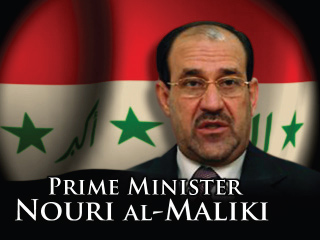Iraqi leader says Islamic state threatens region
By AP | Last updated: Jul 9, 2014 - 12:26:20 PMWhat's your opinion on this article?
IRAQ NEWS - Final Call Full Coverage
BAGHDAD—An extremist group’s declaration of an Islamic state and territory it has seized in Iraq and Syria poses a threat to the entire region, Iraq’s prime minister warned, saying that “no one in Iraq or any neighboring country will be safe from these plans.”
The Islamic State of Iraq and the Levant announced recently that it has unilaterally established a caliphate in the areas under its control. It declared the group’s leader, Abu Bakr al-Baghdadi, the head of its new self-styled state governed by Shariah law and demanded that all Muslims pledge allegiance to him.

|
With the support of other Sunni militants, the extremist group has overrun huge swaths of northern and western Iraq in recent weeks, including the country’s second-largest city, Mosul. The blitz across Iraq appears to have crested, at least for now, as it reaches Shiite-majority areas, where resistance is tougher, and as it seeks to consolidate its control of the territory already in hand.
In what appeared to be a bid to peel away some of the extremist group’s allies among Iraq’s Sunni tribes, Mr. al-Maliki offered an amnesty “for all tribes and people who got involved in any act against the state.”
Mr. al-Maliki offered a similar amnesty after militants seized two cities in central Iraq early this year, but few if any Sunnis took up his offer.
With its recent gains, the Islamic State of Iraq and the Levant now controls a swath of land that stretches from northern Syria to the outskirts of Baghdad in central Iraq. That has sent tremors across the region, particularly in the capitals of Iraq’s neighbors—Saudi Arabia, Jordan and Iran.
The United States, which withdrew the last of its troops from Iraq in 2011, is also keeping close tabs on events.
President Barack Obama has been hesitant to send much military aid to Iraq for fear of dragging the U.S. into another years-long Mideast war. The White House has ruled out sending in combat troops, but sent more soldiers to Baghdad to help bolster the U.S. Embassy. All told, officials say, there are about 750 U.S. troops in Iraq— about half of which are advising Iraqi counterterrorism forces.
U.S. manned and unmanned aircraft are also flying dozens of reconnaissance missions a day over Iraq to gather intelligence.
The Sunni insurgent’s offensive is fueled, at least in part, by the Sunni minority’s long list of grievances with Mr. al-Maliki and his Shiite-led government. They accuse Mr. al-Maliki, who himself is Shiite, of treating them like second-class citizens and unfairly targeting them with the security forces. (AP)
INSIDE STORIES AND REVIEWS
-
-
About Harriett ... and the Negro Hollywood Road Show
By Rabiah Muhammad, Guest Columnist » Full Story -
Skepticism greets Jay-Z, NFL talk of inspiring change
By Bryan 18X Crawford and Richard B. Muhammad The Final Call Newspaper @TheFinalCall » Full Story -
The painful problem of Black girls and suicide
By Charlene Muhammad -National Correspondent- » Full Story -
Exploitation of Innocence - Report: Perceptions, policies hurting Black girls
By Charlene Muhammad -National Correspondent- » Full Story -
Big Ballin: Big ideas fuel a father’s Big Baller Brand and brash business sense
By Bryan Crawford -Contributing Writer- » Full Story






 Click Here Stay Connected!
Click Here Stay Connected!








